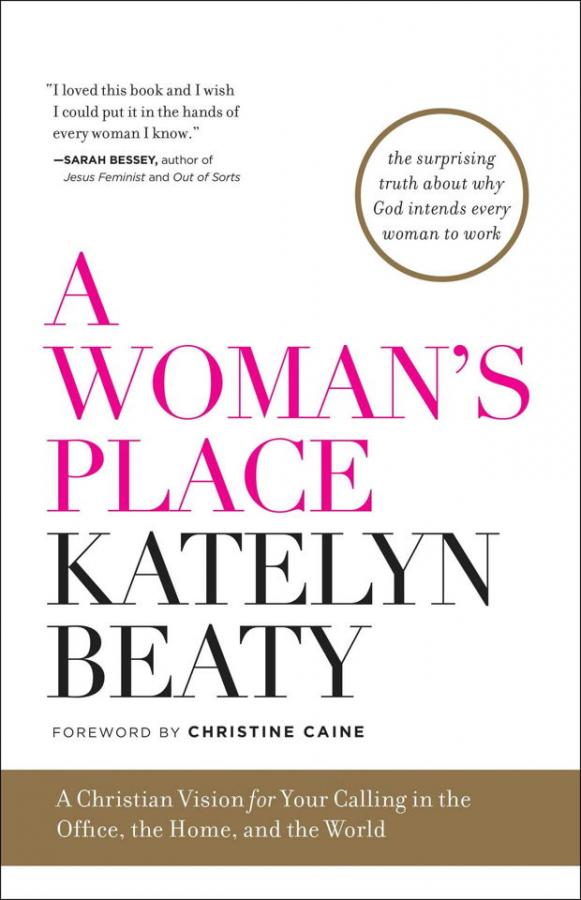To read the beginning of this interview, head to the first part of our conversation with Katelyn Beaty.
Many of our readers at The Well are grad students or in professional schools or beyond — women that are now either scholars or leaders in law, medicine, business, or other professions. Our readers often have to wrestle through decisions about family and work, and how those fit together. And I have seen these questions even with women who are single. I have heard 24-year-old grad students wondering, "I'm giving six years of my life and living in near poverty to get a PhD...what is that going to mean in the future when I want to have children? Should I walk away from this? How do I make those decisions?" Your book is so relevant for those kinds of questions. In the chapter, "How She Does It All," you discuss challenges to integrating professional life and family life. You name three (with alliteration): bodies, bosses, and bureau of lady judgment.
How do "bodies, bosses, and bureau of lady judgment" challenge integrating family life and professional life?
Well, in the chapter on parenting and integrating the call to work and the call to parenting, I was heavily relying on the stories of women that I was meeting at these home groups — what I was hearing from other women as they talked about some of the tensions or challenges of integrating these dual calls. So those three: "bodies" is just biological realities and limitations; "bosses," which is a way of talking about workplace policies and norms, what's understood to be a good employee, what's expected implicitly of employees; then "bureau of lady judgment" was a way of talking about how women relate to each other, especially relating to each other across different ideologies and different choices made for themselves and their own families. Those were three themes that rose to the top in my research.

"Bodies" is a way of acknowledging that the time that women have to have children and the time that many women are getting a lot of energy and direction in their careers — these things actually collide in a woman's life. So it's always struck me as unfair that there is this biological window in which women can have children, and yet I think that it is so much of what's driving a lot of the struggle around trying to integrate a call to parenting and a call to work. A lot of us will talk about feeling pulled in opposite directions, or really stretched, or trying to juggle. This language suggests very few women feel that they can fulfill the requirements and needs of both the call of the workforce and the call of home and raising children.
Next, the limitation of bosses suggests that it is still the case that in many companies and non-profit organizations and universities, the default worker is a man; and so men are not having to wrestle with these tensions of work and home life to the same degree that women are. The United States and Papua New Guinea are the only two countries that do not have a federally-mandated paid parental leave. There are lots of companies who provide this on their own dime, and those can vary anywhere from two months to six months to a year, but even then it's not guaranteed and it's certainly not required by law to provide those for women. I think that that kind of leave is actually a way that organizations and schools and companies can communicate to women, "You are a valuable employee — we do want to accommodate the good choice that you and your spouse have made to have a child, and we want to really put money on the line to support you with the knowledge that you will come back. We want to retain you." I think that more companies are realizing that women and also some men are really looking at those policies as a fundamental baseline. "This has to be in place in order for me to work here." I do tend to think that Christian organizations, and specifically Christian non-profits that are already financially strapped and perhaps working with a more traditional model, are needing to catch up in that regard.
I saw a piece about Catholic organizations in Chicago mandating paid parental leave for all of their organizations, and that struck me as very progressive, but also very pro-family in a way that really aligns with the Catholic teaching on the centrality of the family. We have a teaching on the centrality of the family in the evangelical tradition, which makes it ironic or incongruous that many evangelical organizations don't have a more proactive parental leave.
Then, “bureau of lady judgment" — and yes, I did have to continue the alliteration — is essentially a way of talking about the "mommy wars" and these subtle divisions that can arise among women who are making different decisions about how they're going to integrate work and family life. I think there's a lot of fear of what someone who's made a different decision will think about you. There's a fear of judgment. I also think, because we have so many options and choices available about how to integrate work and family, that the number of choices and the proliferation of choices actually leads to greater insecurity around whether anyone is making the right choice. Every woman I met in the research for this book was utterly committed to the flourishing of her children and would do anything for her children. That love, however, was being expressed in slightly different ways per individual, and I wish that more women could just say to each other, "We are all utterly committed to our children, and it's okay that you've made a different choice than I have."
Of course there are lots of different parenting philosophies and strategies that also divide women into separate groups and lead them to look at each other with suspicion. The sad thing is that I don't think men are doing this — there are no "daddy wars.”
[Laughing] This isn't what dads talk about when they hang out — sometimes they talk about kids, of course, but they're not comparing, "Do you guys crib sleep, or do you bed sleep and why? Tell me all the reasons why." There's a lot less judgment.
Yeah, and I think that reflects the reality that a lot of wives and mothers feel that parenting is still their primary responsibility and is only secondarily their husband's responsibility. That is not because of any laziness on the husband's part, it's just that, again, we have those strong cultural narratives as well as some biological realities — like the way men don’t lactate. [Laughing] News alert for your readers, men do not lactate — and if they did, it would actually change the way that we organize our family lives.
I think there's a conversation to be had in Christian circles about the role of fathers and parenting as a shared responsibility as well as a shared gift. I think that men who work full-time outside the home when their kids are young and only see their children in the evenings and on weekends would actually say, "I'm missing out on something really important and valuable and I wish that I were home more." So are there creative ways that we can add a little bit more of a commitment to co-parenting among Christian families and in Christian circles? Maybe having co-parenting be a norm rather than a weird ideological commitment?

There are systemic issues that are difficult — things like health insurance tends to be only if you're full-time, so what does that look like with co-parenting? With academic tenure track positions, they're almost always full-time. Even if we desire to share parenting more evenly, there are systemic things in place because our work culture was so largely shaped in a male environment.
That actually goes back to our discussion about cultural artifacts and institutions being led only or primarily by men. It makes you wonder how different our workplace policies would be if there had been equal representation of men and women leading our workplace institutions 50 or 100 years ago.
After interviewing so many women and writing this book, what advice would you give to women in grad school and professional school or to women working their way up the academic or professional ladder? What are best practices that you feel like you've seen among women — ways that women can pursue the work that they're called to and be rooted in Jesus in the midst of that?
I think that friendships with other women who are also professionally-oriented can go a long way — thinking through various practical decisions together and realizing that you're not in it alone, that there are women who are wrestling through some of the same decisions that you're wrestling with, that you're in it together, that you can give each other advice and encourage one another and perhaps even mentor each other.
Another kind of practical suggestion that comes to mind is something that I am borrowing from Sheryl Sandberg in Lean In, which is, "Don't leave before you leave." In her research, she talks about women who are relatively young or new in their careers, maybe they're still in college and they're looking down the road of life for the next ten years and they're making decisions with the assumption that they are going to leave the workforce once they get married and have children. She was basically saying “Don't cut yourself short, don't cut yourself off on the basis of this hypothetical reality. Don't assume that you will have to shut the door of professional work once you're in that stage of life, because that stage of life is not guaranteed, you don't know what's going to happen in the next ten years, and also you could very well be in a situation where you can pursue family life and professional life at the same time.”
Another thing that comes to mind — and this was a theme that came up a lot in my interviews — is to find an awesome man who is totally and utterly committed to you flourishing in your professional work. In all the conversations I had with women who are flourishing in their work, that was such a key thing — "I could not do this without the full, complete support of my spouse." I think recognizing that has even shaped the kind of man that I want to be married to, if I am to get married. A kind of foundational deal-breaker is that he has to be utterly and fully committed to my professional flourishing. I think it's very reasonable for that to be a deciding factor as you're meeting men and dating people. What is he going to think about the fact that I'm getting my PhD? If he's not on board, why is that? How would that affect my life down the road? [Laughing.] I'll end on that note: find an awesome Christian man.
[Laughing] Okay, thank you so much for talking with us Katelyn. It's a great book and I hope that it's very widely read.
Thank you!







